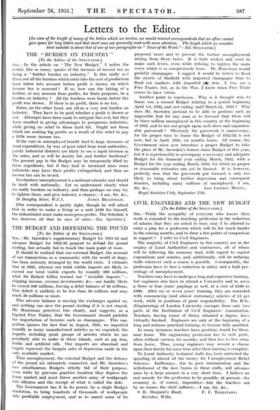Letters to the Editor
[In new of the length of many of the letters which we receive, we would remind correspondents that we often cannot give space for long letters and that short ones are generally read with more attention. The length which we consider most suitable is about that of one of our paragraphs on " News of the Week."—Ed. SPECTATOR.]
THE " BURDEN ON INDUSTRY "
[To the Editor of the SPECTATOR.]
Sin,—In the article on The New 'Budget," I notice the writer, like so many, speaks of the increase of income tax as being a " further burden on industry." Is this really so ? have not all the burdens which enter into the cost of production been taken into account before profit is shown, on which income tax is assessed ? If so, how can the taking of a further, or any amount from profits, for State purposes, be a burden on industry ? All the burdens were borne before the profit was shown. If there is no profit, there is no tax.
Rates, on the other hand, are oft en a very real burden on industry. They have to be paid whether a profit is shown or not. Attempts have been made to mitigate this evil, but they have resulted in giving advantages to prosperous industries, while giving no relief to those hard hit. Ought not those which are Making big profits as a result of this relief to pay a little more income tax.
If the cuts in unemployed benefit lead to large increases of local expenditure, by way of poor relief from local authorities, purely industrial districts are likely to see a rapid increase in the rates, and so will be doubly hit, and further burdened ! The present gap in the Budget may be temporarily filled by these expedients, but if they lead to increased rates some industries may have their profits extinguished, and then no income tax can be levied.
Involuntary unemployment is a national calamity and should be dealt with nationally. Let us understand clearly what are really burdens on industry, and then perhaps we may try to lighten them, and give industry a chance.—I am, Sir, &c.,
[Our correspondent is partly right, though he will admit that in order to make a living or a nett £100 for himself, the industrialist must make more gross profits. The Schedule A tax deserves all that he says of rates.—En. Spectator.]


































 Previous page
Previous page